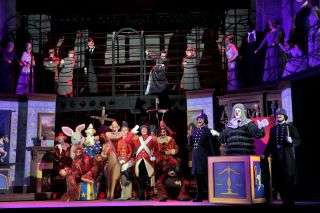|
Back
Oh, Oscar, Oscar, Oscar... Santa Fe
Santa Fe Opera
07/27/2013 - & July 31, August 9*, 12, 17, 2013
Theodore Morrison: Oscar
Dwayne Croft (Walt Whitman), David Daniels (Oscar Wilde), Reed Luplau (Bosie), Aaron Pegram (Detective, Prison warder), Rocky Sellers (Detective, Prison warder), Ricardo Rivera (Hotel manager, Warder Thomas Martin), Heidi Stober (Ada Leverson), Patrick Guetti (Leggatt), William Burden (Frank Harris), Yoni Rose (bailiff), Kevin Burdette (Justice Wills, Colonel Isaacson), Reuben Lillie (Jury foreman), Christian Sanders (Chaplain), David Blalock, Benjamin Sieverding (Infirmary patients)
The Santa Fe Opera Chorus, Susanne Sheston (chorus master), The Santa Fe Opera Orchestra, Evan Rogister (conductor)
Kevin Newbury (director), David Korins (set designer), David C. Woolard (costume designer), Rick Fisher (lighting designer), Sean Curran (choreographer)

(© Ken Howard)
Santa Fe's boldest repertoire choice this year is its world premiere of Theodore Morrison's new opera about the trial and imprisonment (and death) of the Irish wit Oscar Wilde. Co-commissioned and co-produced with Opera Philadelphia, it is hard to pronounce the work a success. As is often the case in contemporary opera, Morrison's score produces few truly memorable passages or music one would easily recall. Much of what is happening in the orchestra pit sounds like movie music, with the predictable sounds for alarm, surprise, sentimentality, almost rigidly in place. Two moments do stand out, however. When Wilde's guilt is pronounced at his trial, the words condemning him flow to the tune of "Rule, Britannia," an ironic if somewhat obvious comment on what imperial social controls can do to the individual. Then when Wilde is imprisoned, his cruel warders introduce him to the crank he must turn ten thousand times a day to fulfill his hard labor requirement. He performs the first few in absolute silence. The moment is emotionally charged, but it is the absence of Morrison's music, and not its accompaniment, that creates the effect. David Daniels is the world's star countertenor, and his technical execution of the part of Oscar Wilde did not disappoint.
For a new work about the still controversial subjects of public morality, gay rights, criminal justice, and the relationship between culture and society, Morrison's drama is surprisingly conventional. The action is narrated by the ghost of Walt Whitman, who had similar problems to Wilde's. While the character is solidly sung by the fine baritone Dwayne Croft, Wilde's story is certainly too well known - or too easy to learn about - for the device really to be necessary. There is also the introduction of Wilde's lover Lord Alfred Douglas, "Bosie," as a mute dancer, not unlike Tadzio in Benjamin Britten's Death in Venice. The effect is poignant when Wilde indulges in fantasy but more often an obstacle to telling the story. Act I centers on Wilde's friendships with Ada Leverson and Frank Harris (sung well by Heidi Stober and William Burden) on the eve of his trial. Should he escape the country on a yacht Harris has obtained? Or should he remain to face justice? The morality play that unfolds more closely evokes the staid parlor dramas that Wilde's own works outclassed on the late Victorian London stage than a truly introspective treatment of a man in crisis written in 2013. The act ends with Wilde's trial, a fanciful scene in which judge and jury are guised as circus freaks, the judge a kind of jack-in-the-box who springs out to pronounce his verdict. Of course this is a devastating judgment on those who judged Wilde - and they are all deep basses in case anyone had any other idea about their characters, - but if the idea to avenge those who dehumanized him, is dehumanizing them really the right thing to do?
A drama about Oscar Wilde could make far greater use of the poet's language and explore his the wit and eccentricities that granted him immortality. Yet we are treated to disappointingly few of the great lines and little of the repartee that keeps the writer alive and valued in a culture of declining literacy. Act II, which shows Wilde plunged into barbarities of prison life, moves somewhat more in that direction, with text adapted from The Ballad of Reading Gaol and maudlin passages from Wilde's letters to Bosie. In case anyone missed the point, we are treated to a gruesomely realistic hanging of the poem's murderous young guards officer. In the end Wilde dies (in prison rather than as he actually did, in Paris some time after his release) and is led by Whitman into a rosy afterlife that virtually broadcast the word "hokey" across the New Mexican desert. It was a surprise to read later that Morrison and co-librettist John Cox wanted to embrace their subject as a hero with a profoundly human side. Despite their best intentions, the dark surroundings, programmatic music, and supporting cast of mean basses do much to reaffirm Wilde as a victim rather than a hero.
Paul du Quenoy
|